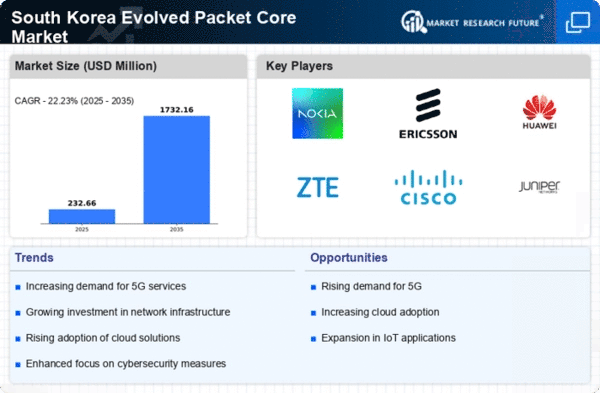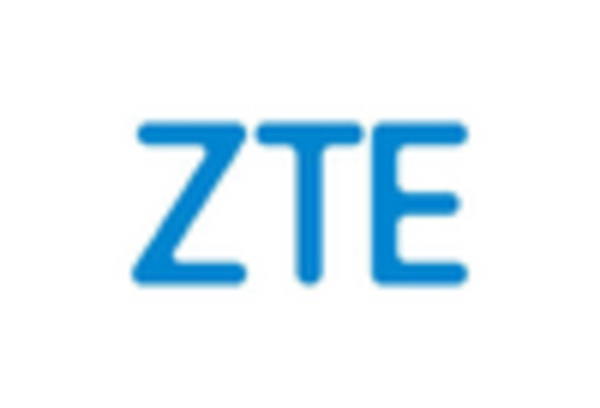Emergence of Edge Computing
The emergence of edge computing is reshaping the landscape of the virtualized evolved-packet-core market. As applications requiring real-time processing and low latency become more prevalent, the need for edge computing solutions is growing. South Korean telecom operators are exploring ways to integrate edge computing with their core networks to enhance service delivery and improve user experiences. This trend is expected to drive innovation within the virtualized evolved-packet-core market, potentially leading to a market expansion of approximately 18% by 2026. The synergy between edge computing and virtualized core networks is likely to create new opportunities for service differentiation and competitive advantage.
Rising Demand for 5G Connectivity
The increasing demand for 5G connectivity in South Korea is a primary driver for the virtualized evolved-packet-core market. As mobile operators strive to enhance their network capabilities, the need for efficient and scalable core network solutions becomes paramount. the virtualized evolved-packet-core market is expected to witness substantial growth, with projections indicating an increase of approximately 30% by 2026. This demand is fueled by the proliferation of IoT devices and the necessity for low-latency applications, which require robust core network architectures. Consequently, telecom operators are investing heavily in virtualized solutions to meet these evolving connectivity requirements, thereby propelling the market forward.
Government Initiatives and Support
Government initiatives in South Korea aimed at promoting digital transformation are significantly impacting the virtualized evolved-packet-core market. The South Korean government has launched various programs to enhance telecommunications infrastructure, which includes substantial funding for 5G and beyond. These initiatives are designed to foster innovation and encourage the adoption of advanced technologies within the telecommunications sector. As a result, the virtualized evolved-packet-core market is likely to benefit from increased investments and regulatory support, potentially leading to a market growth rate of around 25% over the next few years. This supportive environment is crucial for telecom operators looking to modernize their core networks.
Increased Focus on Cost Efficiency
Cost efficiency remains a pivotal concern for telecom operators in South Korea, driving the adoption of virtualized evolved-packet-core solutions. As competition intensifies, operators are compelled to optimize their operational expenditures while maintaining service quality. Virtualized solutions offer a compelling value proposition by reducing the need for expensive hardware and enabling more efficient resource utilization. This focus on cost efficiency is likely to propel the virtualized evolved-packet-core market, with estimates suggesting a growth rate of around 15% in the coming years. Operators are increasingly recognizing that investing in virtualized technologies can lead to substantial long-term savings.
Shift Towards Network Function Virtualization (NFV)
The shift towards Network Function Virtualization (NFV) is a critical driver for the virtualized evolved-packet-core market. Telecom operators in South Korea are increasingly adopting NFV to enhance operational efficiency and reduce costs associated with traditional hardware-based solutions. By virtualizing network functions, operators can achieve greater flexibility and scalability, which is essential in a rapidly changing telecommunications landscape. This trend is expected to contribute to a market growth of approximately 20% by 2026, as more operators recognize the benefits of transitioning to virtualized architectures. The virtualized evolved-packet-core market stands to gain significantly from this ongoing transformation.
















